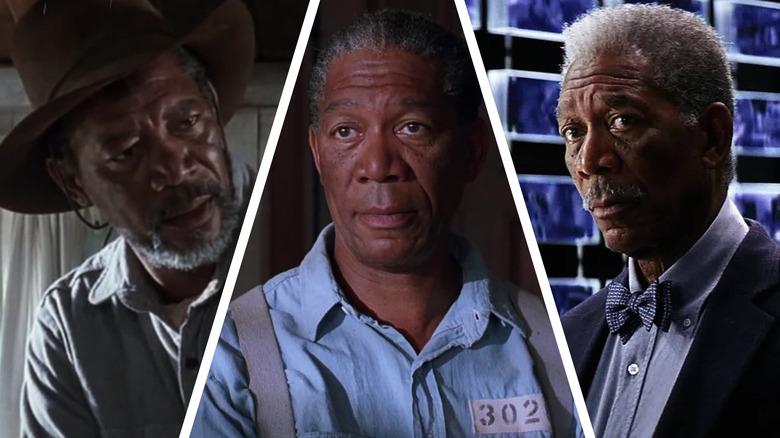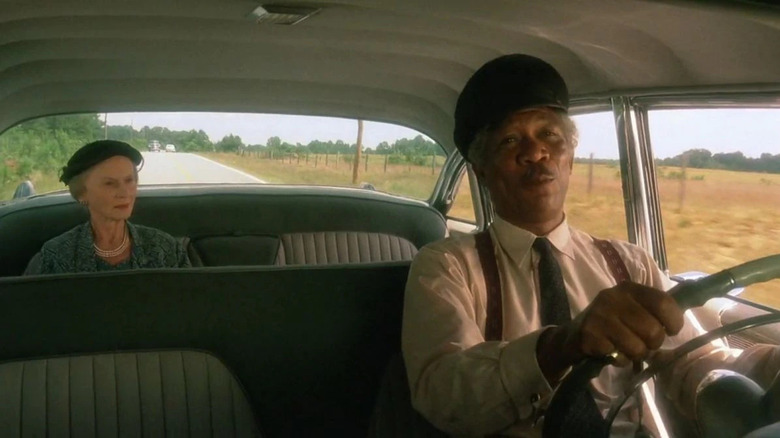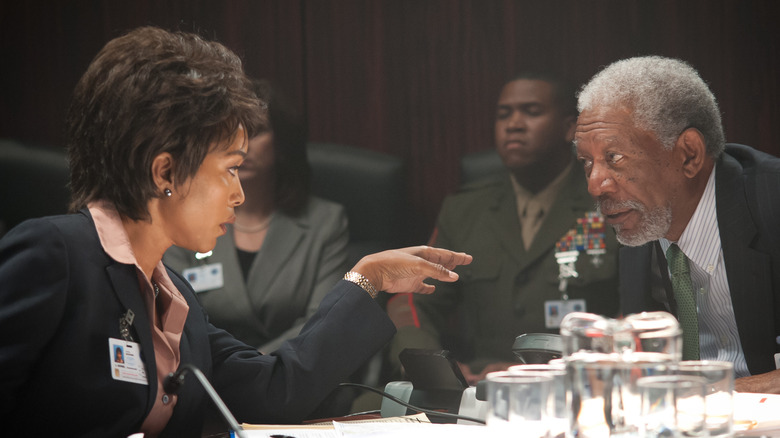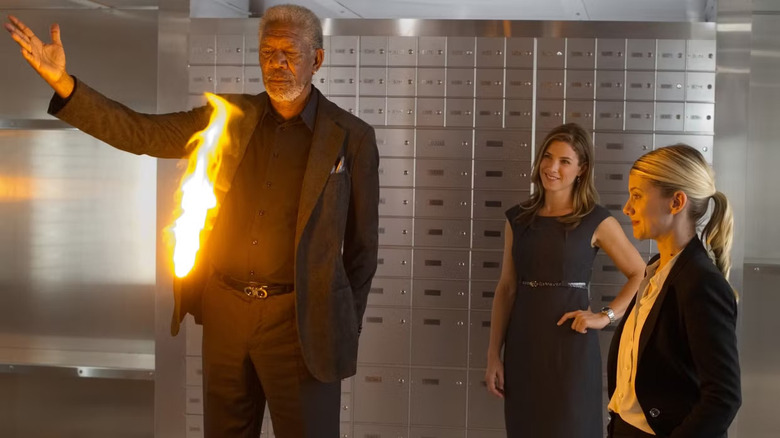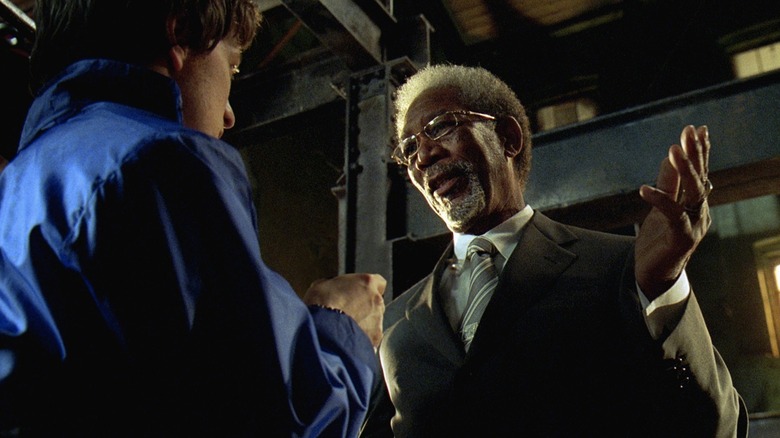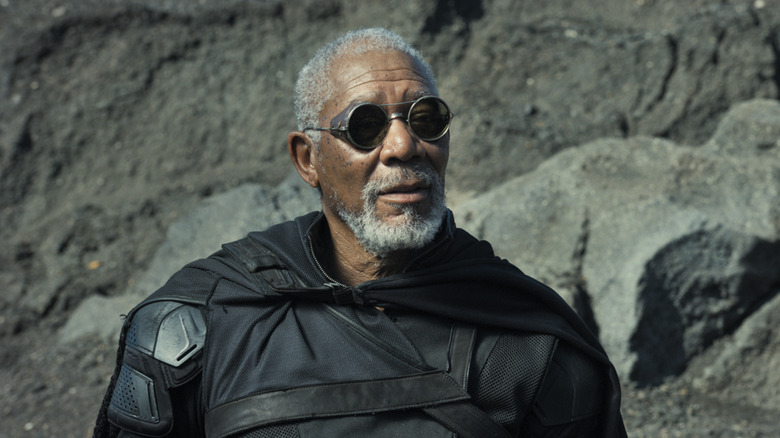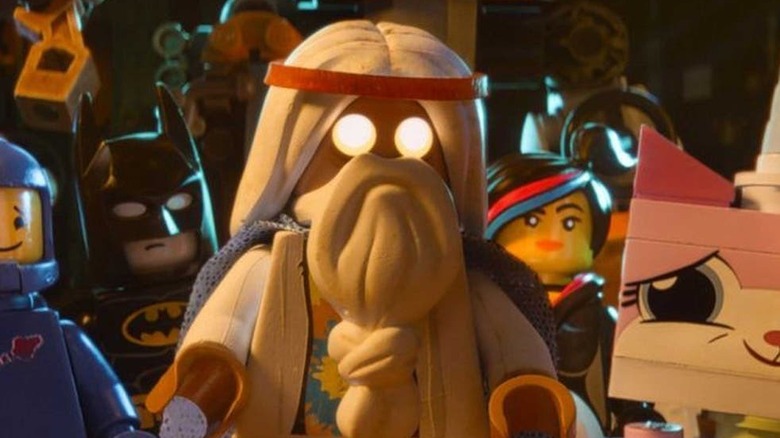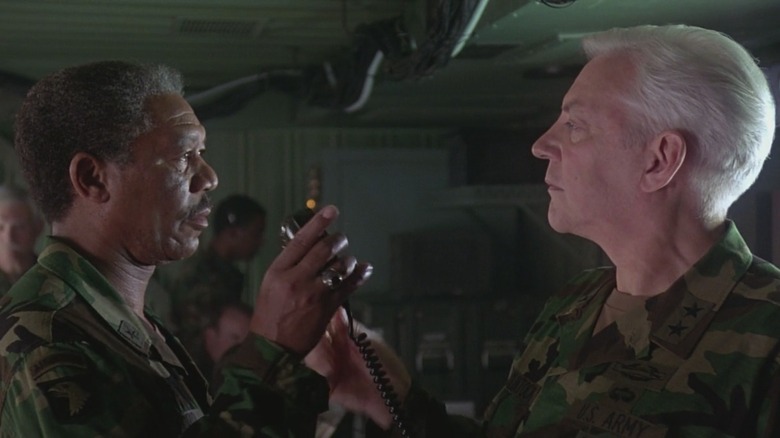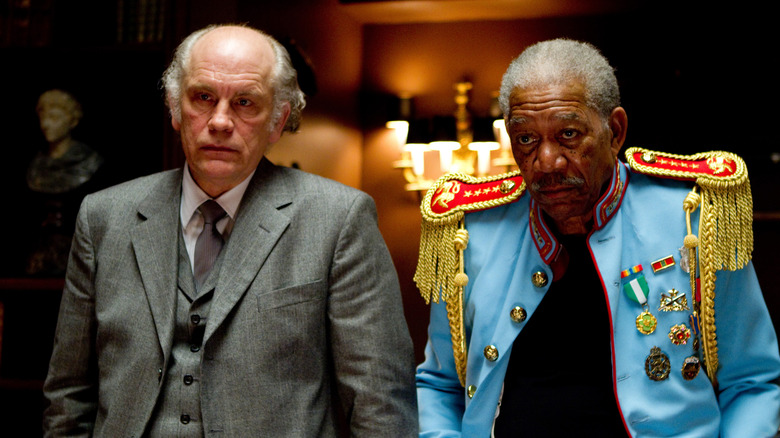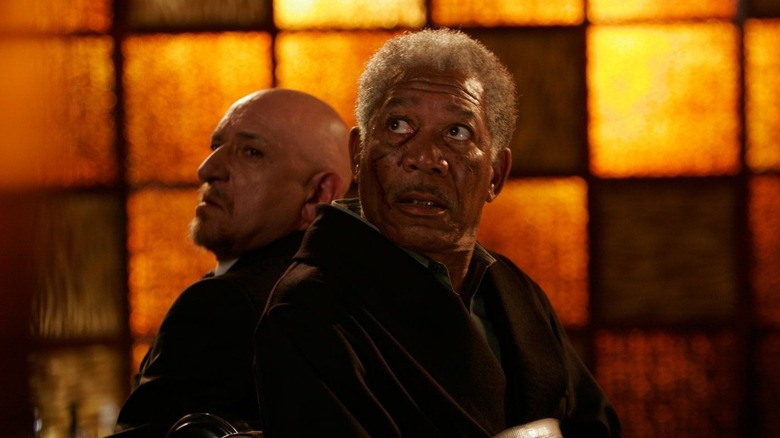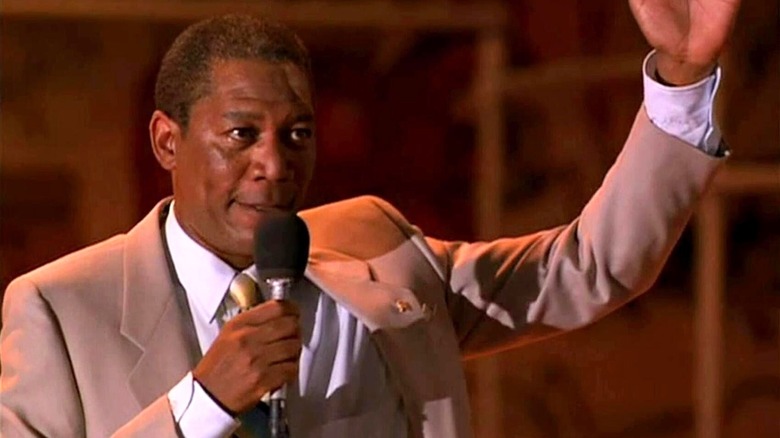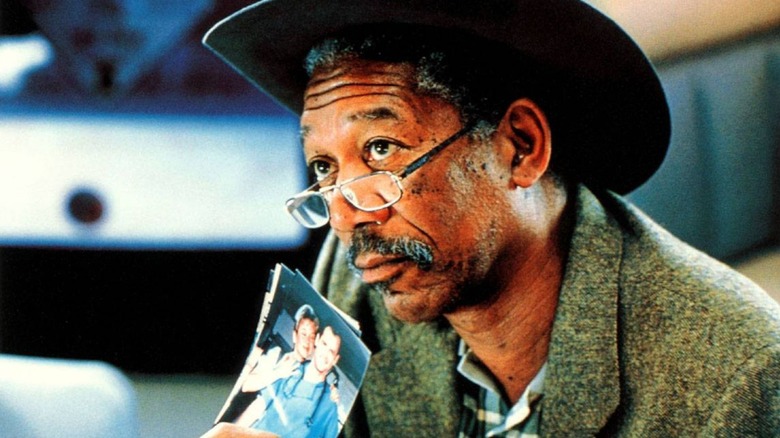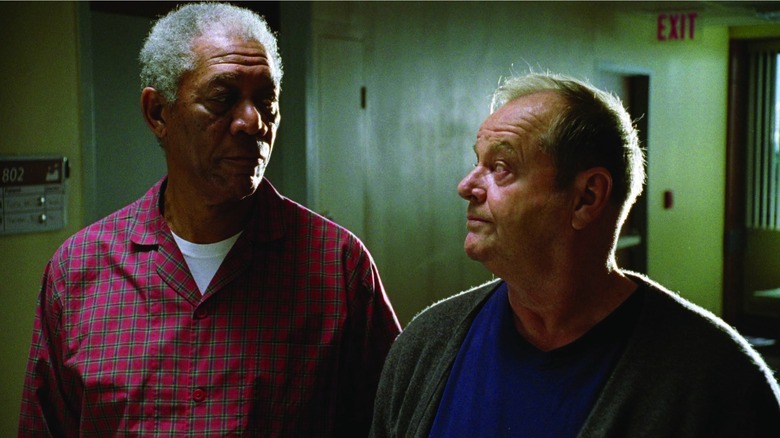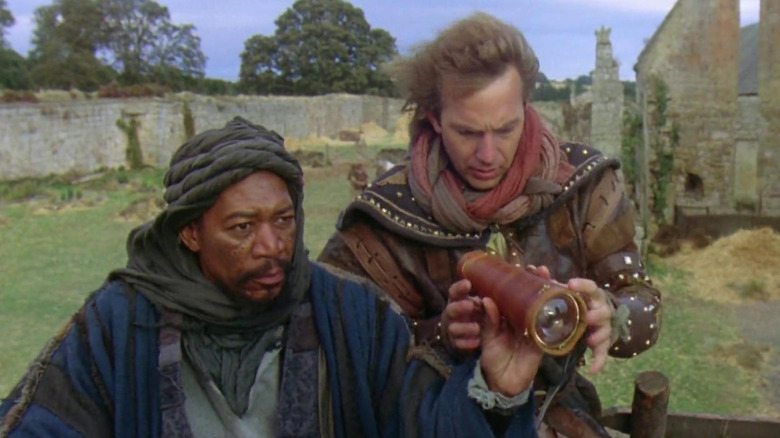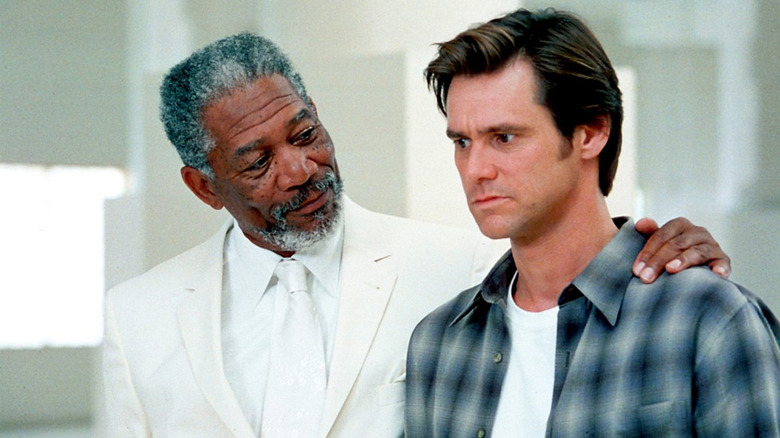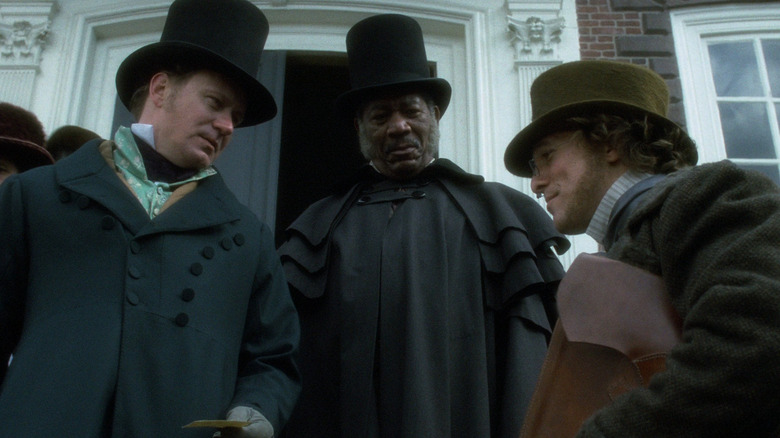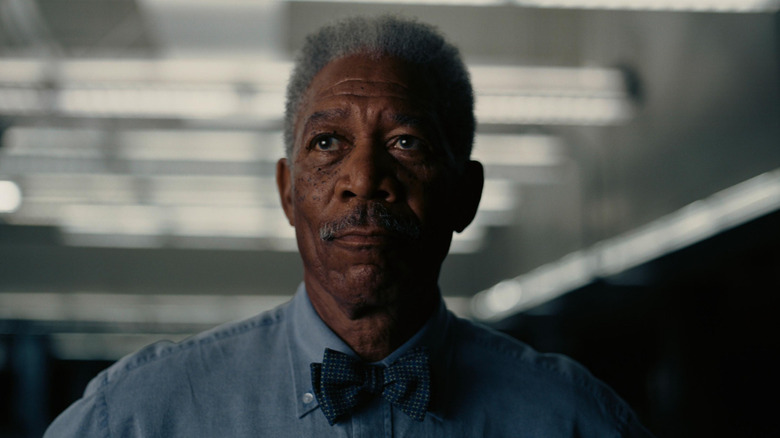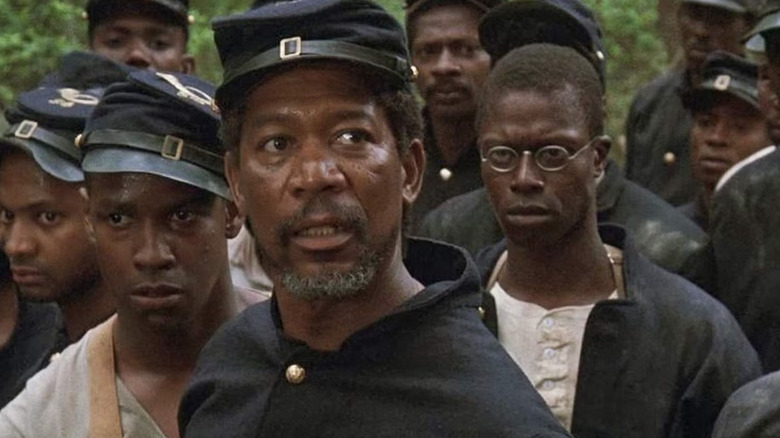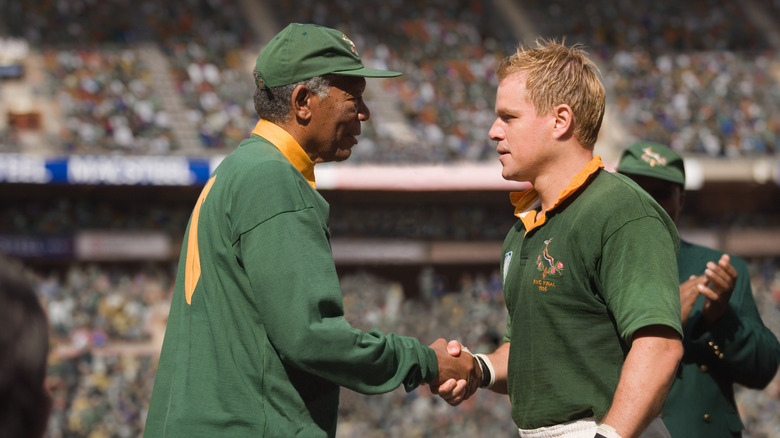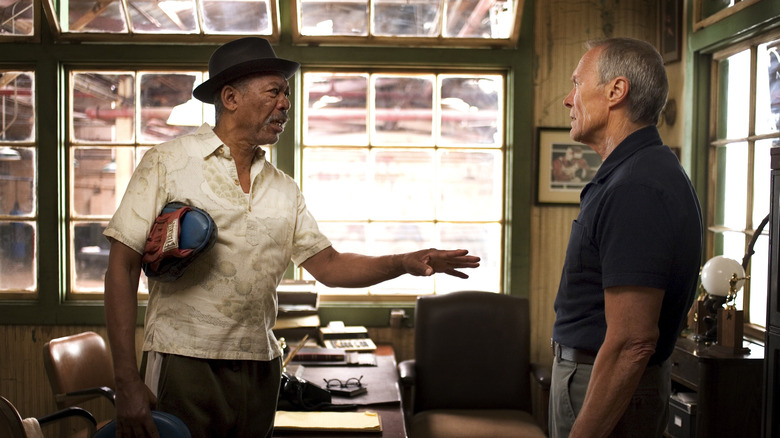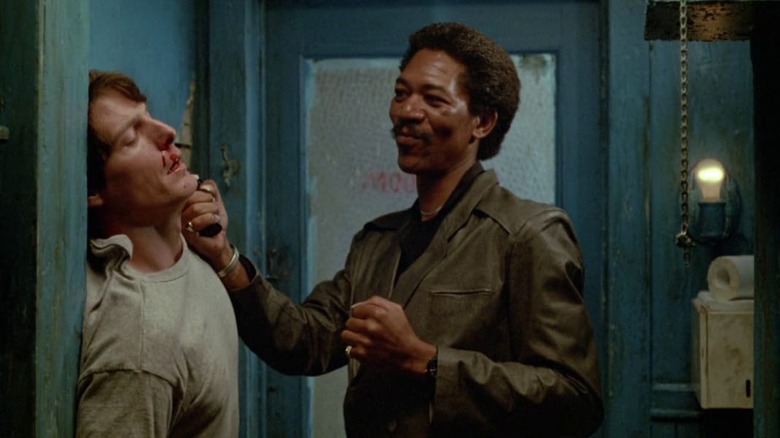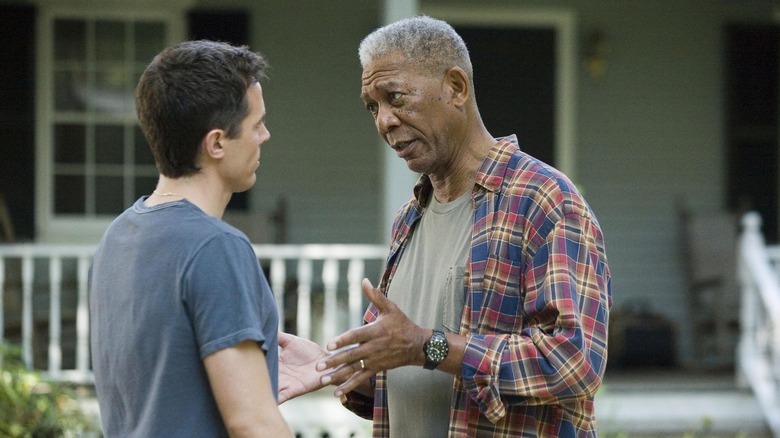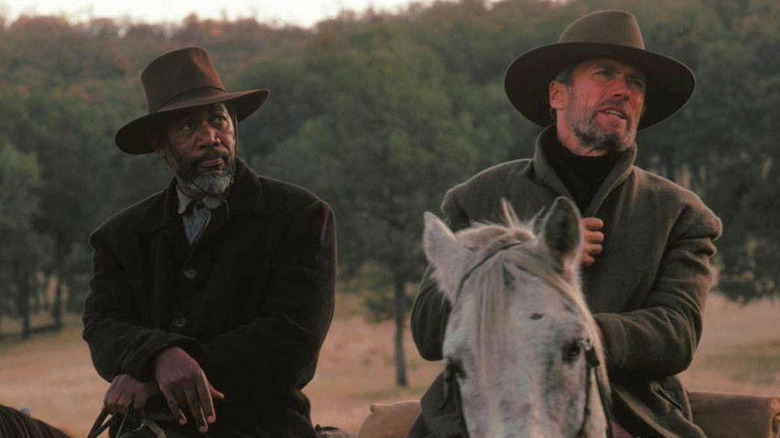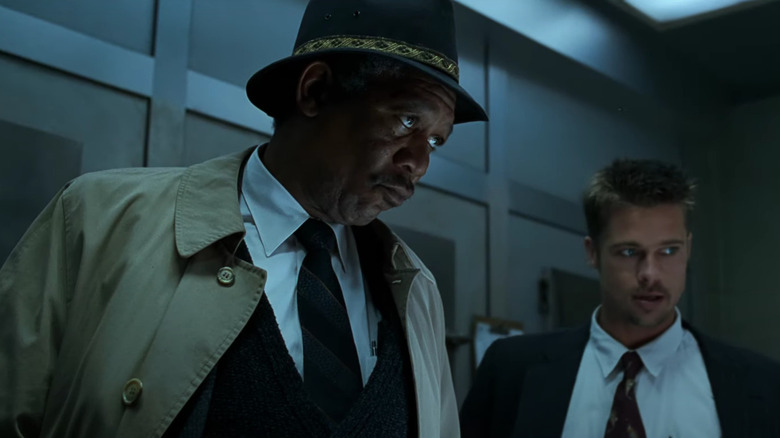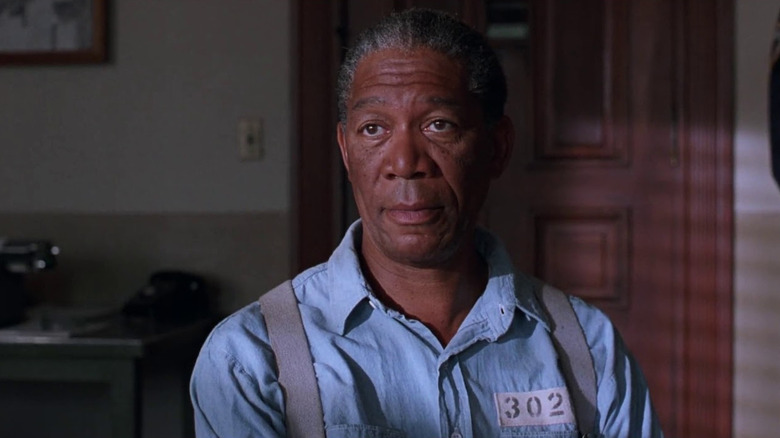Morgan Freeman's 25 Best Roles, Ranked
We may receive a commission on purchases made from links.
Morgan Freeman is one of the most recognizable faces in Hollywood, with credits in over 100 films. Despite his extensive filmography, Freeman actually got his start in film relatively late in his career. A frequent stage performer and star of the PBS children's show "The Electric Company," Freeman landed key breakout roles throughout the '80s that launched him into stardom.
Freeman works consistently and is very reliable. Even in weaker films, Freeman rarely gives a bad performance, and is usually a highlight — sometimes, the only one. He's a very generous actor; Freeman isn't opposed to taking on smaller parts, and is often able to elevate his co-stars. Although he has collaborated with many of the industry's leading directors and participated in highly successful franchises, Freeman frequently works with emerging and independent filmmakers, too.
Although he's known for playing both authority figures and warm fatherly characters, Freeman is quite versatile and often tackles roles that subvert his on-screen image. Freeman has shown his comedic side with lighter performances, and takes on antagonist roles that weaponize his commanding presence. His voice is one of his most distinctive qualities, and he's frequently called on to narrate documentaries and voiceovers. The respect that he generates translates to real life; Freeman often speaks out about social causes, and has fought injustice within the film industry.
Given the depth of his career, narrowing down Freeman's finest work is no easy task, but these 20 performances are his best to date.
25. Hoke Colburn — Driving Miss Daisy
1989's "Driving Miss Daisy" is a very flawed and controversial film. While it attempts to address racial prejudice through a charming friendship, the central relationship simplifies the realities of discrimination and ignores the uglier details. Most problematic is that the film primarily comes from a white creative team and does not spend enough time developing the Black perspective. However, through his involvement, Freeman was able to redeem some of the film's weaker elements, and his performance is easily the best part of the movie.
"Driving Miss Daisy" tells the true story of the retired wealthy widow Daisy Werthan (Jessica Tandy), whose son Boolie (Dan Aykroyd) hires African-American chauffeur Hoke Colburn (Freeman) to transport her. Initially irritated by her new driver's upbeat attitude, Daisy gradually grows to care for Colburn. Although the film is often emotionally manipulative, Tandy and Freeman have terrific chemistry. Freeman imbues the character with optimism; he knows the realities of racism, but chooses to focus on how he can open up his employer's worldview.
The best picture winner earned Freeman a nomination for best actor.
24. Allan Trumbull — Olympus Has Fallen
Amidst the plethora of modern action franchises, the "Fallen" series is unique. A throwback to '90s action movies, the films ditch the campy, self-referential tone of the current action landscape for grittier, R-Rated set pieces inspired by the classics of 30 years ago. While the series got campier as it went along, the original "Olympus Has Fallen" is a terrific version of "Die Hard" set in the White House. After terrorists conquer the Oval Office and take the President of the United States Benjamin Asher (Aaron Eckhart) hostage, a lone Secret Service Agent, Mike Banning (Gerald Butler), is forced to find a way to save the President and his staff.
In the wake of the President's kidnapping, the U.S. Speaker of the House Allan Trumbull (Freeman) is forced to take command. Freeman expertly plays an assertive leader who attempts to make sense out of the unprecedented situation. He's largely out of the action, but helps to guide Banning as they develop a plan of action. When Trumbull is placed under duress when competing governmental figures pressure Asher to sacrifice innocent lives, Freeman's outrage is evident.
"Olympus Has Fallen" is the best of the series, but the sequels expanded Trumbull's role. 2016's "London Has Fallen" saw him promoted to Asher's Vice President and once again forced him to navigate a crisis situation. 2019's "Angel Has Fallen" saw him ascend further to become the President, who helps unravel a conspiracy to frame Banning.
23. Thaddeus Bradley — Now You See Me
The "Now You See Me" franchise may have a confusing continuity thanks to the constant plot twists and nonlinear storytelling, but the charisma of its stars makes the films thoroughly entertaining anyway. The 2013 original follows stage magicians Danny (Jesse Eisenberg), Merritt (Woody Harrelson), Henley (Isla Fisher), and Jack (Dave Franco) as they conduct elaborate performances that expose corrupt corporations through high-stakes robberies. The performance troupe known as "The Four Horsemen" are pursued by FBI Agent Dylan Rhodes (Mark Ruffalo), who out of desperation seeks out ex-magician Thaddeus Bradley (Freeman). Bradley now works to expose magicians by revealing their tricks, but even he is flustered by the Horsemen.
Freeman has a good sense of humor, remarking on Ruffalo's incompetence as the FBI are embarrassed during the magicians' routines. While no longer a performer, Bradley still respects the craft and possesses a childlike wonder at the impressive young group. He's an effective gateway into the magical world and makes even the most heavy-handed exposition compelling. While the first film ends with a shocking twist that changes the viewers' perception of both Bradley and Rhodes, the 2016 follow up "Now You See Me 2" develops both characters even further, forcing them to make a shaky alliance.
22. Wanted
"Wanted" is a 2008 action thriller with lots of style and well-constructed set pieces, thanks to the hyperkinetic impulses of director Timur Bekmambetov. It's also, as you might imagine from an adaptation of a Mark Millar comic, full of annoying edgelord posturing, especially in the cloying direct address moments from James McAvoy as our lead. But in the context of Morgan Freeman's career, it's an interesting spoke for reasons that require spoilers to discuss.
There's a kind of mystical league of assassins at the heart of "Wanted," one that McAvoy is initiated into, where he learns, among other things, the ability to curve a bullet (which, to be clear, rules). Freeman plays Mr. Sloan, the leader of this group who shows McAvoy's character the ropes, allowing the actor to slide into familiar territory of "authoritative mentorship and exposition dumps."
It's functional and entertaining but not necessarily remarkable. That is until – and here comes the spoilers as we explain the ending – it's revealed Mr. Sloan is kind of the main villain, choosing the assassin's targets for his own selfish gain. Freeman's flip into out-and-out villainy is delightfully surprising, making this an intriguing wrinkle in his filmography. (Gregory Lawrence)
21. Bill Cabot — The Sum of All Fears
Tom Clancy's literary hero Jack Ryan has been portrayed by Alec Baldwin, Harrison Ford, Chris Pine, and John Krasinski, and Ben Affleck interprets the CIA analyst as a self-assured womanizer made cocky by his intelligence. Giving his less authoritative performance, "The Sum of All Fears" required an actor of gravity to play Ryan's mentor and supervisor, CIA Director Bill Cabot. Freeman fills the requirements perfectly; he communicates the imminent danger that a Russian military coup presents, yet also grows exasperated by Affleck's adolescent antics.
"The Sum of All Fears" isn't an origin story, and Affleck and Freeman depict a believable onscreen friendship between two men who have experience working with each other. Cabot adds appropriate humor, mocking Ryan's inability to secure a relationship and his flustered communication in professional settings. However, Freeman never diminishes the seriousness of the situation. Cabot is also more active than Ryan's other screen mentors, working to evacuate the President from a threatened football stadium.
20. Malcolm Beech — Oblivion
"Oblivion" is among the most underrated science fiction films of the past decade, an introspective mystery that explores the lengths humanity takes in order to survive the aftermath of a devastating extraterrestrial invasion. A majority of humanity has relocated to galactic colonies, but a few surviving technicians patrol the remains of Earth repairing robotic drones. Among them is Jack Harper (Tom Cruise), whose isolated outpost is threatened by enigmatic scavengers.
Freeman appears as the scavenger's leader Malcolm Beech, who reveals to Jack that the mysterious forces are actually surviving humans who are hunted by his drones. The drones actually serve a destructive artificial intelligence syndicate that staged the war. Freeman is appropriately cold and calculating; Beech is a combat veteran who's been hardened by the deceitful conspiracy, but sees the importance in converting Jack to their cause. Freeman and Cruise form a compelling bond as isolated loners who work together out of necessity, yet grow a friendship that reminds them of all that Earth has lost.
19. Master Builder Vitruvius — The LEGO Movie
One of the best animated films of the decade, "The LEGO Movie" satirizes oversaturated product placement, genre clichés, and overused character archetypes. The traditional "chosen one" narrative is lambasted when the savior of the LEGO universe turns out to be the goofy, hapless construction worker named Emmet (Chris Pratt) who has never had an original thought. Emmet learns of his destiny from the Master Builder Vitruvius (Freeman), a blind wizard who explains that he's destined to build wondrous creations without following the instructions.
Freeman parodies his normal narrator role; Vitruvius is deadpan in his seriousness, but weaves in insults as he mocks Emmet's lack of originality and his disastrous early creations. Freeman has great comic timing. Though he's convinced that Emmet is their savior, he's exasperated by the wacky oddball. "The LEGO Movie" cleverly parodies the reappearing mentor trope, too, when Vitruvius is brought back as a ghost.
18. Billy Ford — Outbreak
The paranoia of "Outbreak" is more terrifying today, in the wake of an actual pandemic. Wolfgang Petersen's 1995 thriller follows the rapid spread of a deadly virus after leading medical Colonel Sam Daniels (Dustin Hoffman) and Dr. Roberta Keough (Rene Russo) discover a lethal strain in Africa. Daniels and Keough are constantly at odds with the overbearing government officials that hold back their research, as the military-minded Major General Donald McClintock (Donald Sutherland) is willing to make any sacrifices to human life along the way.
Freeman has a sympathetic role as Daniels' supervisor Brigadier General Billy Ford, who is aware that McClintock's covered up an earlier outbreak. Although he's part of the military, Ford supports the scientists and is put in an uncomfortable position when Daniels isn't given the resources he's needed. Freeman shows this strain, particularly during the gripping finale in which Ford is forced to go up against his commanding officers.
17. Joe — Red
The DC graphic novel adaptation "Red" gives its cast of renowned actors a chance to flex their comedic chops with self-aware roles. The film follows a group of retired hitmen who are called back into their former professions after a conspiracy involving the U.S. government and the mafia threatens to draw them out. Frank (Bruce Willis) is discovered trying to live a normal life by former colleague Marvin (John Malkovich), and the pair recruits Victoria (Helen Mirren) and Joe (Freeman).
Freeman gives the film its heart. While Willis brings his signature smart aleck attitude, and Malkovich and Mirren challenge perceptions with wild, eccentric performances, Freeman reminds his friends of the stakes. Joe is terminally ill, and despite years of training, the debilitating sickness has depleted his abilities. "Red" avoids being an outright parody by grounding the emotional center; while these assassins are comically adept at combat, they're unable to live with any sense of normalcy.
16. The Boss — Lucky Number Slevin
Although he's often an inviting presence, Freeman can also subvert his persona to play intimidating villains. He's an actor that commands respect, and thus is perfectly cast in the neo-noir thriller "Lucky Number Slevin" as the feared kingpin known only as the Boss. The Boss is caught in a gang war with rival mobster the Rabbi (Ben Kingsley) and each plot to execute each other's sons. The Boss's information proves bad when he accidentally kidnaps Slevin (Josh Hartnett), mistaking him for his debt-stricken neighbor Nick. The Boss recruits him in his scheme to take vengeance on the Rabbi.
"Lucky Number Slevin" is constantly adding twists, with frequent reveals forcing the viewer to reassess their perceptions of prior scenes. Freeman delivers necessary exposition without making it dull, and his presence amplifies the tension as Slevin tries to piece together the clues. Hartnett may not be the most charismatic actor, but he's elevated by the veterans that surround him. The climactic showdown in which Kingsley and Freeman finally meet face-to-face is a satisfying union of screen titans.
15. Lean on Me
"Lean on Me," from acclaimed director John G. Avildsen ("Rocky," which was weirdly pivotal in the evolution of filmmaking tech), is the kind of movie that would have regular rotation in a substitute teacher's VCR — and I mean that as a sincere compliment.
It's a meat-and-potatoes inspirational drama about an encouraging principal (Freeman) who heads to an underprivileged school and inspires all of his students using unorthodox methods that put him in conflict with teachers, administrators, and parents alike.
There's a lot about the film that plays with familiar, even anodyne energy and dynamics, let alone with uncomfortable and outdated stereotypes. But there's also an eccentric, authentic feeling of bitterness at the core of Freeman's performance; "tough love" with an emphasis on the former. It gives "Lean on Me" power and discomfort in equal measure, elevating it above the typical "inner city school teacher" drama. We often think of Freeman as a genial figure, and seeing him cut to the core of the nonsense around him is always good for a dramatic jolt. (Gregory Lawrence)
14. Nurse Betty
A black comedy of phenomenal discomfort and even ugliness, "Nurse Betty" comes from Neil LaBute, a filmmaker and playwright whose stock in trade is black comedy, phenomenal discomfort, and even ugliness. Morgan Freeman's character is a hitman who threatens to scalp his target in his very first scene, if that gives you an indication of the sense of humor on display.
The titular Nurse Betty (a fearless Renée Zellweger) witnesses Freeman and his hitman partner, Chris Rock (in one of his best movies, too), kill this target, her husband. And she loses her entire mind, assuming the identity of a soap opera character and traveling across the country to meet her new love, Greg Kinnear, playing an actor who plays a doctor on that very same soap opera.
Freeman and Rock have unfinished business with Betty and chase her across the country, playing Tarantino-esque scenes of bickering and chit-chat along the way, which is a fun energy to see Freeman inhabit. Later in the picture, his character grows some feelings toward Betty and learns a shocking realization about his hitman partner. His resulting actions are simultaneously deepening and deeply, deeply misanthropic. It's the kind of man his character from "Se7en" would've rooted for the entire time. (Gregory Lawrence)
13. The Bucket List
I first saw "The Bucket List" on a plane, and I maintain that it is the ideal setting for this weepy Rob Reiner dramedy. It's manipulative, predictable, and unsubtle — and cruising at 30,000 feet, it played me like a fiddle.
Morgan Freeman and Jack Nicholson, making a conscious decision to go comedic, star as two men with terminal illnesses and unfinished business. So they make and set upon their "bucket list," a collection of activities one must do before kicking the bucket. As the men drive fancy cars, travel to exotic locales, and go freakin' skydiving, they also learn about each other's emotional and familial bucket list and do their best to resolve what they can before the time comes.
Freeman and Nicholson are obviously enjoyable to watch. They have an easy rapport and their well-established screen personae bounce off each other satisfyingly. Justin Zackham's screenplay (which, among other things, coined the cultural term "the bucket list") uses familiarity and sappiness as features, not bugs, in the film's vocabulary. It's Mitch Albom-core, and I mean that as a compliment. (Gregory Lawrence)
12. Azeem Edin Bashir Al Bakir — Robin Hood: Prince of Thieves
Kevin Costner may have generated derision for his unconvincing British accent, but thankfully, he's surrounded by a great ensemble that elevates his performance in "Robin Hood: Prince of Thieves." Alan Rickman's over-the-top depiction of the wicked Sheriff of Nottingham is certainly entertaining, but Freeman has an equally important role as the Moor Azeem Edin Bashir Al Bakir. Azeem swears Robin a life debt and becomes his trusted ally during the early stages of his rebellion against the English crown.
In a film that often veers into melodrama, Freeman takes the material seriously and helps ground it with actual stakes. His warm appreciation for Robin reinforces the importance of their mission; each life is important. Freeman also adds touches of humor as the two banter about the infeasibility of their task at hand. While action films generally tend to sideline Freeman, "Robin Hood: Prince of Thieves" gives him a chance to showcase his physicality and get in on the fighting himself.
11. Bruce Almighty
It makes sense that Morgan Freeman would, at one point in his career, play God, Our Lord and Creator. He's often cast for his sonorous voice (which didn't happen by accident), mentoring those around him with love and accountability. To play God, as he does in "Bruce Almighty," is a natural peak for Freeman's career.
The comedy stars Jim Carrey as Bruce Nolan, a TV reporter whose life isn't going as he wanted, including getting fired after an on-air tirade. So, as many of us have done, he complains directly to God, telling Him He should be the one who gets fired. And God shows up to Bruce and basically says, "Bet," taking the week off and giving Bruce all of his powers. Hilarity ensues, as you might expect, but so does a surprising amount of heart and ideas about faith.
Freeman's stability is a great foil for Carrey's shenanigans, but he doesn't play God as some kind of boring dud or anything. Instead, he gives Him charisma and humanity, at times flowing into a kind of "lil' stinker" territory I find very appealing. Now, someone needs to cast Freeman as Satan, for the sake of balance. (Gregory Lawrence)
10. Theodore Johnson — Amistad
"Amistad" is a gripping historical epic from Steven Spielberg that benefits from Freeman's authenticity within the historical setting. Few actors share Freeman's ability to be believable in any time period and to convincingly capture the dialect and behavioral differences of various eras. "Amistad" allows Freeman to spotlight an unsung historical hero often left out of textbooks.
"Amistad" follows the 1839 slave revolt led by Joseph Cinqué (Djimon Honsu) and the defense effort by former U.S. President John Quincy Adams (Anthony Hopkins) and criminal defense attorney Roger Sherman Baldwin (Matthew McConaughey). The situation is put under spotlight by abolitionist Theodore Johnson (Freeman), who assists Baldwin in investigating the wreckage of the ship and preparing his defense. Freeman eloquently explains the importance of the cause to Baldwin, and his words' impact is evident as Baldwin argues the case. Freeman expresses his horror as they uncover the survivors of the vessel and explains the prisoners' experiences to Baldwin; his gentleness makes Cinqué more comfortable, and Freeman gives the former slave the chance to tell his story.
"Amistad" is unique among films that cover the sensitive topic of slavery, as while Baldwin's victory allows Cinqué to return to his homeland, it's only one painful story among countless others. Any film detailing slavery requires a respectful, yet unflinching approach, and the ensemble succeeds in the difficult task of turning real horror into a compelling dramatic narrative. Freeman's work is a standout.
9. Lucius Fox — The Dark Knight
Among the stacked ensemble in Christopher Nolan's game-changing Batman trilogy, Freeman once again proved he could stand out even alongside other great performers. First introduced in "Batman Begins," Freeman plays the critical role of Lucius Fox, a friend of Thomas Wayne's who develops advanced gear and technology for Wayne Enterprises. Fox plays a more significant role in "The Dark Knight," where he's tasked with developing an advanced Batsuit that allows Bruce Wayne (Christian Bale) to operate overseas, and develops radar technology that Batman uses to track down the Joker (Heath Ledger).
Freeman's intelligence helps to ground Batman's gadgets in reality. He meticulously describes the process of testing and developing the new features, and raises moral questions about the consequences of relying on this technology. The surveillance technology he's developed is immersive, and Fox fears that anyone with that power could easily be corrupted. Having seen the descent of Harvey Dent (Aaron Eckhart) and how the Joker has pushed Bruce to embrace his darker impulses, Fox's cautious words are a necessary reminder that all characters have their flaws.
Freeman also adds much needed humor to the intense story, teasing his boss about his alternate identity when he falls asleep during company meetings. However, he's also tasked with keeping his secret away from prying eyes, even defending Bruce's innocence when the scheming accountant Coleman Reese (Joshua Harto) threatens to expose him.
8. John Rawlins — Glory
Freeman often chooses projects that speak to his interest in progressive social causes, and "Glory" was a breakthrough in Hollywood's representation of African-American history. With a mostly black ensemble, "Glory" elevated its characters beyond token supporting roles and explored a variety of Black perspectives. Spotlighting the Union Army's first all-Black battalion during critical battles throughout the Civil War, "Glory" tells an inspirational story of Black heroism without shying away from the horrors of racism and slavery.
After a critical wartime injury, Colonel Robert Gould Shaw (Matthew Broderick) is assigned to lead an African-American brigade and searches for recruits, including John Rawlins (Freeman), Thomas Searles (Andre Braugher), and Trip (Denzel Washington). Shaw recognizes Rawlins' leadership skills and promotes him to sergeant major, but he quarrels with Trip. This sparks a fascinating debate between Rawlins and Trip throughout the film. Trip doesn't see value in fighting for a country that denigrates him; Rawlins recognizes the nation's systemic issues, but sees the opportunity to enact change through moments of heroism.
The sensitive discussions are delivered with appropriate gravity by Freeman and Washington. Freeman does an excellent job at showing Rawlins's restraint; while he's just as angered as Trip by the prejudice within the Union Army, he uses the opportunity to create a productive relationship with Shaw. Freeman delivers rousing calls to arms as the Black soldiers march into battle. "Glory" succeeds by focusing on the accomplishment of these men without trivializing their experience.
7. Nelson Mandela — Invictus
It takes courage for any actor to take on a historical figure as important as Nelson Mandela, but Clint Eastwood knew what he was doing when casting Freeman. As an inspirational leader who can delicately discuss troubling topics, Freeman easily slips into the role of the South African anti-apartheid activist and future president. "Invictus" does not seek to summarize all of Mandela's achievements; instead, it focuses on the year after he was elected to office after being imprisoned.
Facing skepticism from global leaders, Mandela sees an opportunity to inspire hope by winning the 1995 Rugby World Cup, making this a powerful sports movie on top of a historical drama. Mandela calls a meeting with the national rugby team's captain François Pienaar (Matt Damon) and communicates the importance of their success: The mixed-race team could show the world stage that South Africa has moved on from apartheid and united while racial tension is still running high. The friendship between the two men is fascinating, as while the freedom fighter and the athlete have little in common, they share an optimism about their prospects. François has even greater respect for Mandela after visiting the prisons where he was held captive.
Freeman does a great job at humanizing Mandela by imbuing him with personality, and even humor. An intimate moment in which Mandela reveals to François how the poem "Invictus" inspired him during the revolution pays off. The words are brought back as a voiceover during the film's conclusion, when Mandela sees the country in celebration.
6. Eddie Dupris — Million Dollar Baby
Freeman finally won an Academy Award for best supporting actor for his performance in Clint Eastwood's best-picture winner "Million Dollar Baby." Eastwood and Freeman work together frequently and have many similar strengths, as they both know the power of patient storytelling and can break down the tough sensitivities behind close- off characters. Freeman's inherent friendliness often compliments the grizzled Eastwood, and "Million Dollar Baby" features one of their strongest onscreen friendships. Eastwood wisely chose to feature Freeman as the film's narrator, and his presence makes the emotional boxing drama even more impactful.
Eastwood stars as former boxer Frankie Dunn, who operates a training facility in Los Angeles alongside his long-time assistant Eddie Dupris (Freeman). Blinded in a fight early in his career, Dupris was once known as "Scarp-Iron" for his savagery, but now takes comfort in passing on his knowledge to a new generation. Dupris worries that Dunn doesn't find the same pleasures in teaching, and that his strained relationship with his daughter has forced him to give up hope. He sees a window of opportunity when the outgoing waitress Maggie Fitzgerald (Hillary Swank) requests training; although Dunn promises that he "doesn't train girls," Dupris thinks she could provide him with hope.
Dupris' honesty is integral to Dunn's healing, and Freeman provides a voice of support after Fitzgerald is critically injured and hospitalized. A subplot featuring Dupris' training of the intellectually-disabled boxer Danger (Jay Baruchel) is a compelling simultaneous storyline that shows his humility.
5. Leo Smalls — Street Smart
Although he got his start within children's television and became the embodiment of warm, sensitive characters, Freeman's breakout role was as a terrifying villain, and it's one that he never wanted to revisit. Ahead of his involvement in slick studio productions, Freeman proved he could bring his excellence to a low-budget project from Cannon Films. "Street Smart" is a pulpy crime thriller filled with morally ambiguous characters, and the nasty window into the criminal underworld makes for a unique entry in Freeman's filmography.
The film follows New York City journalist Jonathan Fisher (Christopher Reeve), who is worried about being fired by his editor when he's unable to produce any compelling story pitches. After a disastrous night with a prostitute, Fisher is threatened by the pimp Leo Smalls (Freeman). While humiliated by the experience, Fisher decides to invent the story of a fictional pimp named Tyrone that murders one of his clients. The story becomes an unexpected sensation and Fisher reaches local celebrity status, but his newfound success puts pressure on Smalls. Only just released from prison on a murder charge himself, Smalls is now being mistaken for Fisher's creation and aims to track down the deceitful writer.
"Street Smart" is fascinating for casting actors against type; Reeve gave his last superhero performance in "Superman IV: The Quest for Peace" the same year, so it was surprising to see him as a shady character. Freeman showed his versatility and elevated the project to prestige; he received his first Academy Award nomination for best supporting actor.
4. Captain Jack Doyle — Gone Baby Gone
Freeman is so often associated with warm characters that his untrustworthy roles become even more shocking. Freeman subverts his general persona in "Gone Baby Gone," where he's cast as Captain Jack Doyle. Doyle is investigating the death of the four-year-old girl Amanda. He's first seen as an ally to private investigators Patrick McKenzie (Casey Affleck) and Angie Gennaro (Michelle Monaghan), who are flustered by the barriers set by Amanda's mother Helene (Amy Ryan), a drug addict. Patrick has seen the ugly side of the city and turns to Doyle.
Patrick's reliance on Doyle grows as he uncovers criminal conspiracies in the police department; Sergeant Remy Bressant (Ed Harris) is involved with a money laundering scheme that profits off of the kidnapping. However, Patrick discovers that the seemingly kind police captain is not all that he appears. Doyle was involved in the kidnapping from the beginning and worked to frame a local drug lord by leading Patrick to him. Doyle's intentions for Amanda aren't malicious; he knows about her troubled home life and doesn't want her to fall down the same path of addiction that Helene did. By "rescuing" Amanda and secretly raising her as his own child, he believes he's doing the right thing.
The situation presents an interesting moral quandary, and Freeman is able to make Doyle's case compelling. His steadfast belief in his own principals makes the decision even more difficult for McKenzie, who must decide whether or not to turn him in.
3. Ned Logan — Unforgiven
Clint Eastwood's deconstruction of the gunslinger is a heartbreaking commentary on the western genre and allowed Eastwood to reflect on the types of characters he'd played throughout his career. "Unforgiven" features one of Eastwood's most sensitive performances as retired hitman Will Munny, as he shows a vulnerability he isn't always known for, but it also marks his greatest achievement yet in directing an ensemble. "Unforgiven" features a terrific cast, including Gene Hackman's Academy-Award winning and unsettling performance as the cruel Sheriff Little Bill Daggett, but Freeman is equally as important. He co-stars as Munny's lifelong friend Ned Logan, who is roped back into a life he'd all but abandoned.
Munny has set aside gunslinging in order to raise two young children on a farmstead, but he's called back into action when the up-and-coming bounty hunter the Schofield Kid (Jaimz Woolvett) asks for his help tracking down two cowboys that brutalized local girls. Munny sees this as an opportunity to save his farm and recruits Logan to join him, but his former companion is reluctant. Not only has Logan seen his fair share of killing, but he knows how quickly Munny can transform into a violent person. Eastwood and Freeman are completely believable as lifelong friends who know each other better than they know themselves.
Logan's death is absolutely devastating, as unlike Munny he actually sought redemption. His brutal hanging by Little Bill inspires Munny's wrath during the grizzly conclusion.
2. William Somerset — Se7en
"Se7en" saw Freeman as a weathered, experienced character whose worldly experience gives him great insights. Freeman slipped into the role of Detective Lieutenant William Somerset, whose cynical approach to law enforcement's failures put him at odds with his new partner David Mills (Brad Pitt). Mills is idealistic and sees an opportunity to distinguish himself by tracking down a deadly killer who conducts murders inspired by the seven deadly sins. Somerset knows from years hunting down criminals that they'll find little satisfaction at the end of their mission.
Freeman is terrific at matching Somerset's steeliness with empathy; while he scolds Mills for being impulsive, he also passes on his knowledge through gentle reminders. Somerset's conversations with Mills' wife Tracy (Gwenyth Paltrow) are particularly heartfelt, as she confides in him that she's expecting a child. While supportive, Somerset has his own experiences raising kids amid their dangerous profession and warns her to be cautious. Their tender connection makes Tracy's grizzly death during the film's climax even more emotional.
The murders in "Se7en" are often terrifying, and watching someone who has seen as much violence as Somerset show genuine shock communicates the gravity of the situation. Somerset feels helpless, particularly during the final moments, when Mills succumbs to his own violent impulses. Freeman's gravelly voice delivers one of the darkest closing lines in cinematic history for the film's ending: "Ernest Hemingway once wrote, 'The world is a fine place and worth fighting for,'" he says mournfully. "I agree with the second part."
1. Red — The Shawshank Redemption
"The Shawshank Redemption" features one of the great cinematic friendships. Kindness is scarce among inmates of the Shawshank State Prison, yet wrongfully convicted Andy Dufresne (Tim Robbins) still endures. His only source of friendship is the cynical Red (Freeman), who has been detained on a smuggling charge since he was young. Although Red has a hardened outlook as a result of the cruel prison staff and miserable conditions, he's transfixed by Andy's positive attitude.
Red characterizes Freeman's signature warmness, but he's not instantly friendly. Initially mocking Andy for his profusion of innocence, Red takes pity on his new friend and provides him with hard-to-find objects, including the Rita Hayworth poster and hammer that Andy uses to escape. Freeman often commands authority, and though Red is degraded by the prison staff, he has a leadership role within the community. The other prisoners have their own skepticism about Andy's notions of hope, but Red is able to convince them.
Few actors can deliver a monologue with Freeman's gravity, and the final moments of "The Shawshank Redemption" are even more powerful thanks to his voice. Red is often a cold character who sternly scolds the prison staff for their mistreatments, and following his parole he fears he'll never be able to adjust to normal life. As Freeman reads Andy's letter, moved by the knowledge that he'll see his lifelong companion once more, it's hard not to get teary-eyed.
